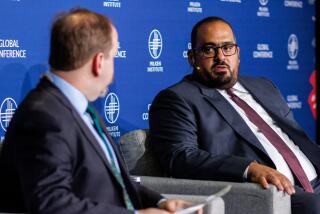Kuwait Has Invested Oil Funds Prudently in U.S., Expert Says
- Share via
Former Treasury Secretary G. William Miller has described the Kuwaiti government, which has invested as much as $40 billion in the United States, as a “prudent” investor that is interested in long-term gains.
Miller said the kingdom’s estimated $80 billion in worldwide investments stemmed from a decision to invest some of its oil profits in “what they call a fund for future generations . . . a quasi-trust fund. If the oil runs out, people will still have the benefits. . . . They don’t want to squander or waste it.”
Miller, who has developed a “broad relationship” with the Kuwaiti government, serves on the board of directors of Georgetown Industries, a Charlotte, N.C.-based company that is one of the few U.S. companies in which the Kuwaitis own a controlling interest. One of Georgetown Industries’ holdings is a majority interest in National City-based Western Lumber, a building supply store chain.
The Kuwaiti government operates its investments “as if they were a pension fund,” Miller said Friday. He said they are looking for a diversified investment of all their funds designed to keep them valuable.
The Treasury Department says Kuwait has invested largely in stocks, bonds, Treasury notes and other securities. That broad mix of investments has made it difficult for federal regulators to track Kuwaiti investments, a challenge that arose Aug. 2 when President Bush issued an executive order that froze Kuwait government investments in the United States.
Although some in Congress are calling for regulations to make it easier to track foreign investments, Miller argued that more rules would needlessly stifle investment.
Miller, who was secretary of the Treasury when then-President Jimmy Carter froze Iran’s assets in the United States, said it is not necessary to know “contemporaneously” how much foreign money is in the United States to freeze assets.
“We thought it was about $6 billion, and it turned out that $12 billion was blocked,” Miller said. “Did it matter? We do know that (the block) was effective. . . . People were to abide by the law, and they did.”
However, Miller said the Georgetown Industries majority stake is the exception rather than the rule. Although the Kuwaitis are becoming somewhat more visible as majority or controlling shareholders, “they started off in the U.S. mainly in portfolios, things like stocks and bonds, hiring money managers to manage, just as a pension fund would.”
The Kuwaitis began making more direct investments in Europe several years ago after establishing the Kuwait Investment Office in London, Miller said.
Miller described the Kuwaiti government’s investments as “never obtrusive. They’re more often in the minority position,” he said.
But, since the establishment of the Kuwait Investment Office, the Kuwaitis have purchased larger stakes in a wide variety of European companies, from petroleum refining and distribution to the Daimler Benz automobile company.
“I think they have been very prudent investors,” Miller said. “And they are truly just investors. They do not create any difficulties for countries. That makes them very welcome.”
At Georgetown Industries, the Kuwaitis have been “excellent stewards,” Miller said. “They’ve been very supportive of the company; the company has prospered under (their ownership). They have a very strong balance sheet.”
The Kuwaiti interest in Georgetown Industries, which now stands at more than 90%, was largely accumulated when the Kuwaiti Ministry of Finance acquired shares held by a German stockholder who went bankrupt.
More to Read
Inside the business of entertainment
The Wide Shot brings you news, analysis and insights on everything from streaming wars to production — and what it all means for the future.
You may occasionally receive promotional content from the Los Angeles Times.









